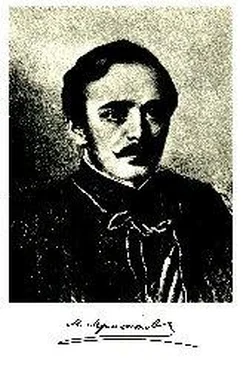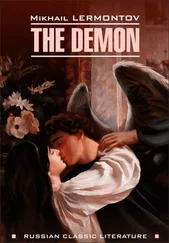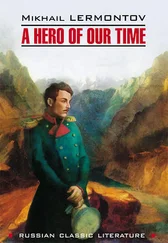"That's Princess Ligovskaya," said Grushnitsky, "and her daughter, whom she calls Mary in the English manner. They've been here only three days."
"You seem to know her name already."
"Heard it quite by accident," he replied, blushing. "I must confess I have no desire to meet them. These haughty aristocrats look upon us army men as savages. What's it to them if there's an intellect under a numbered cap and a heart beneath a thick overcoat?"
"Poor overcoat," said I, smiling. "And who is the gentleman going up to them and so obligingly offering them a glass?"
"Oh, that's the Moscow dandy Rayevich! He's a gambler, as you can see by the heavy gold chain across his blue vest. And look at that thick cane-just like Robinson Crusoe's! Or the beard he sports, and the haircut à la moujik [86] cut very short.
."
"You seem to bear a grudge against the whole human race."
"And with good reason..."
"Really?"
By this time the ladies had left the well and were again passing us. Grushnitsky hurried to strike a dramatic pose with the help of his crutch and replied loudly to me in French: " Mon cher, je haïs les hommes pour ne pas les mépriser, car autrement la vie serait une farce trop dégoûtante . [87] "My friend, I hate men in order not to despise them – otherwise life would be too disgusting a farce."
"
The attractive young princess turned and bestowed on the speaker a long and searching glance. It was an obscure kind of look, but without a trace of mockery. I mentally congratulated him on it from the bottom of my heart.
"This Princess Mary's extremely pretty," I said to him. "Her eyes are like velvet, yes, velvet. I'd advise you to adopt this expression when you talk about her eyes: the eyelashes, both upper and lower, are so long that the sunbeams find no reflection in her pupils. I love eyes like that-without a shine in them, and so soft that they seem to be caressing you... By the way, I think they are the only good point in her face... And are her teeth white? That's very important! It's a pity she didn't smile at your grandiloquence."
"You talk about a pretty woman as if she were an English thoroughbred," said Grushnitsky indignantly.
" Mon cher ," i replied, trying to fall into his tone, " je méprise les femmes pour ne pas les aimer, car autrement la vie serait un mélodrame trop ridicule . [88] "My friend, I despise women in order not to love them – otherwise life would be too ridiculous a melodrama."
"
I turned and walked off. For half an hour I strolled along the vine-clad walks, along the limestone rocks and among the low bushes between them, until it grew hot and I hurried home. As I passed by the sulfur spring I stopped to rest in the shade of the covered gallery and thus became a witness of a rather interesting spectacle. This is how the actors were placed. The elder princess was sitting with the Moscow dandy on a bench in the gallery and seemed to be engaged in a serious conversation. The young princess, having apparently drunk her last glass full of water, was strolling thoughtfully up and down by the spring. Grushnitsky was standing at the well. There was no one else around.
I went up closer and hid behind a corner of the gallery. Just then Grushnitsky dropped his glass on the sand and tried to stoop to pick it up, but his wounded leg made it hard for him. Poor man! How he tried, leaning on his crutch, but failed. His expressive face actually registered pain.
Princess Mary saw all this better than I did.
Quicker than a bird she was at his side, bent down, picked up the glass and handed it to him with an inexpressibly sweet gesture. Then she blushed furiously and cast a glance in the direction of the gallery, but, seeing that her mother had not noticed anything, immediately regained her composure. When Grushnitsky opened his mouth to thank her she was already far away. A minute later she left the gallery in the company of her mother and the dandy, but as she passed Grushnitsky she assumed a most prim and proper air, not even turning her head in his direction or noticing the fervent gaze with which he escorted her until she disappeared behind the lime trees of the boulevard at the foot of the hill... He caught a last glimpse of her bonnet on the other side of the street as she hurried into the gateway of one of the finest houses in Pyatigorsk. Behind her walked her mother, who bid farewell to Rayevich at the gate.
Only now did the poor smitten cadet become aware of my presence.
"Did you see that?" he asked, gripping my hand firmly. "She's simply an angel!"
"Why?" asked I, pretending utter innocence.
"Didn't you see?"
"Of course, I saw her picking up your glass. If there had been a park keeper around he would have done the same, only quicker in hopes of getting a tip. Though it is not surprising that she took pity on you: you made such an awful face when you put your weight on your wounded leg…"
"Weren't you moved at all, the moment that you saw her soul shining in her eyes?"
"No."
I was lying, but I wanted to stir him up. I have an inborn urge to contradict. My whole life has been a mere chain of sad and futile opposition to the dictates of either heart or reason. The presence of an enthusiast makes me as cold as a midwinter's day, and, I believe, frequent association with a listless phlegmatic would make me an impassioned dreamer. I must also admit that at that moment an unpleasant but familiar sensation lightly crept over my heart; that sensation was envy. I say "envy" frankly, because I am accustomed to being honest with myself. And it is unlikely that any young man (a man of the world accustomed to indulging his vanities, of course), who, having met a woman who attracted his idle fancy, would not be unpleasantly impressed upon seeing her favor another man no less a stranger than he.
Grushnitsky and I descended the hill in silence and walked down the boulevard past the windows of the house which our enchantress had entered. She was sitting at the window. Tugging at my sleeve, Grushnitsky gave her one of those mistily tender looks that evoke so little response in women. I directed my eyeglass at her and saw that Grushnitsky's glance brought a smile to her face while my impertinent examination made her very angry. Indeed, how dare a Caucasian army officer level an eyeglass at a princess from Moscow?
The doctor dropped in to see me this morning. His name is Werner, but he is a Russian. There is nothing surprising in that. I once knew an Ivanov who was a German.
Werner is in many respects a remarkable man. He's a skeptic and a materialist like most medical men, but he's also a poet, and that quite seriously-a poet in all his deeds and frequently in words, though he never wrote two verses in his life. He has studied the vital chords of the human heart the way men study the ligaments of a corpse, but he had never been able to make use of his knowledge just as a splendid anatomist may not be able to cure a fever. As a rule, Werner secretly laughed at his patients, yet once I saw him cry over a dying soldier. He was poor and dreamed of possessing millions, but he would not have gone a step out of his way for the sake of money. Once he told me that he would rather do an enemy a favor than a friend, because in the latter case it would amount to profiting by one's charity, whereas hatred grows in proportion to the generosity of the enemy. He had a malicious tongue, and branded by his epigrams, more than one kindly soul came to be regarded as a vulgar fool. His competitors, envious practitioners at the spa, spread a rumor that he drew caricatures of his patients-the latter were furious and he lost practically all his clientele. His friends, that is, all the really decent people serving in the Caucasus, tried in vain to boost his fallen prestige.
Читать дальше

![Михаил Лермонтов - A Hero of Our Time [New Translation]](/books/27671/mihail-lermontov-a-hero-of-our-time-new-translati-thumb.webp)










